US Targets Houthi Weapons Ready For Attack On Ships
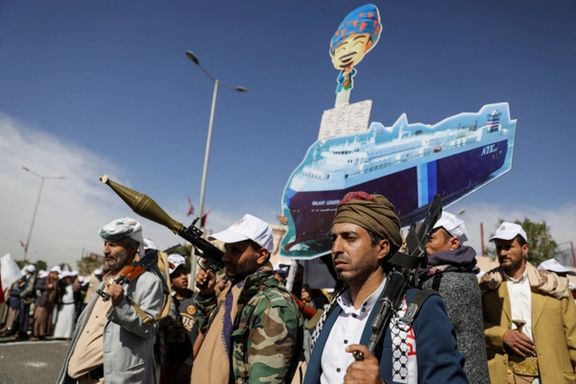
US forces on Thursday conducted seven "self-defense" strikes against Houthi naval drones and cruise missiles that were prepared to be launched against ships in the Red Sea, the US military said.

US forces on Thursday conducted seven "self-defense" strikes against Houthi naval drones and cruise missiles that were prepared to be launched against ships in the Red Sea, the US military said.
"CENTCOM identified these missiles and USVs (unmanned surface vessels) in Houthi-controlled areas of Yemen and determined they presented an imminent threat to U.S. Navy ships and merchant vessels in the region," the US Central Command said in a statement on X.
Iran-backed Houthis began attacking commercial vessels and US warships in mud-November after the Islamic Republic’s Supreme Leader Ali Khamenei called on Muslims to blockade Israel.
The Houthi campaign has disrupted international shipping, which uses the Red Sea and the Suez Canal to link Europe with Asia. The United States and Britain have recently launched strikes on Houthi targets in Yemen and returned the militia to a list of "terrorist groups."
Iranian armed proxy militias have been launching attacks on US forces also in Syria and Iraq since mid-October. After a few smaller retaliatory strikes, the United States launched a large air campaign on February 3, targeting dozens of bases belonging to militias controlled by Iran’s Revolutionary Guard.
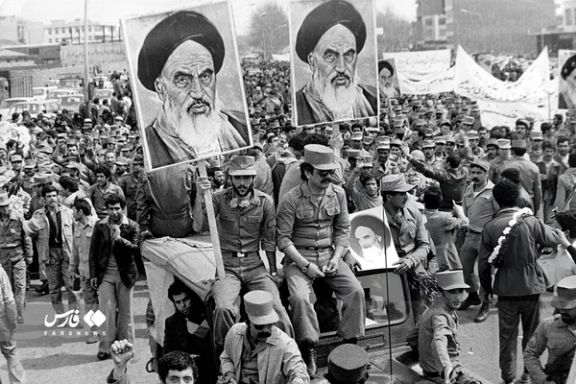
A member of Iran's Expediency Council suggests that while the Islamic Republic was once promising to become the Japan of the Middle East, it now risks resembling North Korea.
Morteza Alviri made these remarks in an interview with reformist daily Etemad in Tehran on Tuesday. He attributed Iran's current trajectory to a deviation from the original vision of the revolution, outlined during Ruhollah Khomeini’s manifesto in Paris before his return to Iran in 1979. At that time, the fundamentalist cleric was promising democracy, freedom and equality to Iranians.
Alviri, born in 1948, has had a varied political career, serving in the Iranian parliament thrice, as Mayor of Tehran, a Tehran city councillor, and Iran's ambassador to Madrid. However, his journey began as a student and an Islamic revolutionary activist, once planting a bomb at the office of a weekly magazine in Tehran prior to the 1979 revolution. His transformation into a moderate politician followed, as others around him became more radical.
Alviri emphasized in the interview that many of Iran's current crises stem from a broader crisis of governance. He noted that in the revolution's early years, both extremes of the political spectrum believed they held solutions. However, failure to adhere to revolutionary principles has exacerbated Iran's problems.
However, what Alviri fails to point out is that the Islamic revolutionaries were inherently anti-West and isolationist, traits that their Communist partners in the revolution shared. These characteristics were to an extent in conflict with the need to follow path of development that was rational and secular.
Khomeini initially promised that the Islamic Republic would be a progressive and democratic state. Alviri lamented that this vision has diverged significantly from the reality Iranians voted for in 1979. But again he fails to mention the likelihood that Khomeini made these promises to rally the people to topple the monarchy, and was necessarily committed to the lofty goals.
At the revolution's onset, Alviri argued, there was an intention to maintain press freedom, allowing journalists to express themselves without fear. He recalled a time when the prevailing belief was that every Iranian citizen was an integral part of the new regime. There were no notions of political purification or religious mandates like mandatory hijab. "There was no political purification on anyone's mind, and no one thought of arbitrary vetting of candidates in elections. There was no compulsory religious behavior such as an obligation for women to wear hijab and university professor never thought that they would be expelled from their workplace."
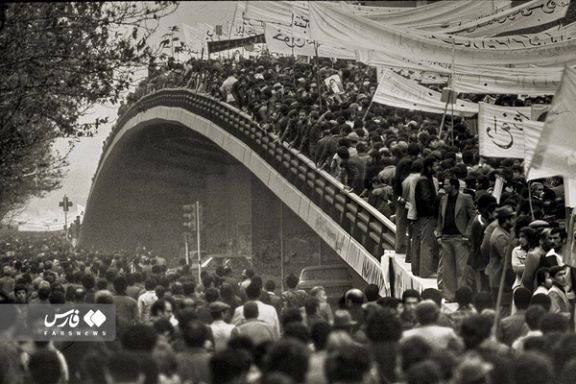
In stark contrast, another interview in Etemad portrayed the Islamic Republic as resembling North Korea, according to Yadollah Javani, the deputy commander of the IRGC. Javani accused "enemies" of attempting to sow discord between the people and the Supreme Leader. He acknowledged internal problems but focused on external threats, neglecting widespread poverty and corruption.
Javani’s discourse is typical of regime officials who dismiss most problems of governance in Iran and blame the United States and others for their unwillingness and inability to pursue economic growth.
Javani claimed that, so far, the people have protected the regime against all conspiracies. He called the Islamic revolution a miracle, despite other officials' acknowledgement that about 70 percent of the population living under the poverty line. The claim about popular support also contradicts dwindling freedoms and the regime’s repeated brutal suppression of protests.
Javani further claimed that there was nothing wrong about the Islamic Republic. Only the officials need to explain to the youth why the Islamic Republic is the continuation of the holy prophet's movement. Javani obviously ignored the extent of financial and ethical corruption among officials.
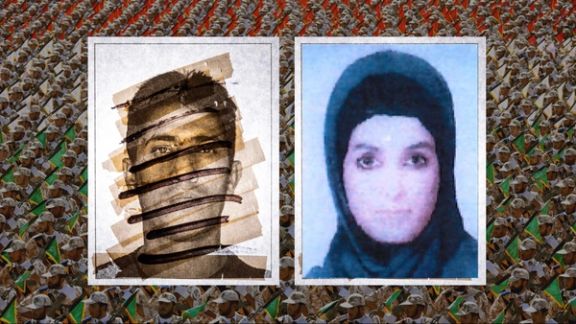
The Swedish foreign minister spoke to his Iranian counterpart following revelations of an IRGC plot to murder Swedish Jews, warning that the allegations are being treated as a "very serious" issue.
Tobias Billstrom spoke to Hossein Amir-Abdollahian on Thursday following a Swedish Radio report revealing the deportation in 2022 of two Iranians illegally in Sweden plotting to kill Swedish Jews.
“It is very serious that Iranian agents on Swedish territory have tried to murder Swedish citizens, and the fact that the targets were Jewish naturally makes it even more serious,” Billstrom stressed.
The couple, Mahdi Ramezani and Fereshteh Sanaeifarid, who had entered Sweden in 2015 on forged Afghan passports seeking asylum, were arrested in 2021 but deported in 2022 after police could not take proceedings further.
They intended to target three Swedish Jews including Aron Verständig, Chair of the Official Council of Swedish Jewish communities, who was informed of the plot in 2021. One of the other potential targets was a dual US citizen.
The suspects, believed to have been part of an IRGC plot, lived under fake identities in the country.
Deputy chief prosecutor Hans Ihrman said the FBI in the US was also investigating the couple. While there was not enough evidence to prosecute in Sweden, Ihrman said: “We have strong belief that they were here on a mission on behalf of Iran. They were seen here in Sweden as a very severe security threat. And that's the reason why they were expelled, even if we couldn't prosecute them."
Meanwhile, Daniel Stenling, head of counterintelligence in Sweden's security service, confirmed that the couple “prepared and pursued activities” with the aim of “being able to carry out physical attacks against someone or something in Sweden.”
Stenling further added that over the past years, the Swedish security services have managed to foil several other attacks planned by Iran against Sweden.
“It is already known that Iran also poses a major intelligence threat to Sweden, and that risk remains,” he went on to say.
Jews and Israelis abroad have increasingly been targets of the regime in recent years; several Iran-backed plots have been foiled in different countries including Greece, Cyprus, Azerbaijan and Argentina.
In September, the head of Israel's Mossad, David Barnea, said that Israel and its allies had foiled 27 attacks over the past year in Europe, Africa, southeast Asia and South America.
Last year, Sweden's parliament voted to designate the IRGC as a terrorist organization.
Tehran-Stockholm ties have been ever more strained since 2019 and the arrest of a former Iranian jailor, Hamid Nouri. Sweden sentenced him to life imprisonment last year over executions of political prisoners in Iran in 1988.
During the phone call, Billstrom also urged the immediate release of Johan Floderus, a Swedish diplomat of the European Union who was detained in April 2022 during a vacation in Iran on what appears to be trumped up charges of espionage.
In the fifth and concluding trial session of Floderus held at the Tehran Revolutionary Court in January, the prosecutor's representative demanded the strictest punishment for the 33-year-old Swedish citizen.

Three days after the detention of 30 journalists at the office of liberal-leaning website Fardaye Eghtesad in Tehran, five remain missing, raising fears they have been detained.
The newspaper's editor, Ali Mirzakhani, deputy editor, Behzad Bahmannezhad, and three video-journalists have not returned home since Monday and no information has been disclosed regarding their whereabouts and conditions.
On Monday evening, security forces raided the office of the economic news site, detaining and holding 30 journalists incommunicado inside the building overnight. They also confiscated all office computers and electronic devices, including mobile phones, and interrogated the staff.
The judiciary’s official news agency, Mizan, released a statement on Tuesday, claiming that the raid and journalists’ arrests were not linked to journalistic activities but were under investigation by a security agency.
Iranian media and observers say the detentions might be linked to a recent revelation published about Iran's international clandestine fund transfers.
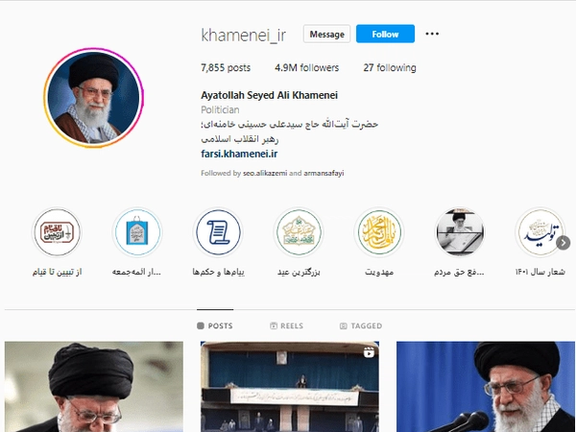
Meta, the owner of Instagram and Facebook, has removed the accounts of Iran’s Supreme Leader Ali Khamenei on the two platforms.
“We have removed these accounts for repeatedly violating our Dangerous Organizations & Individuals policy," Middle East Eye news website quoted a Meta spokesperson as saying.
Based on that policy, “organizations or individuals that proclaim a violent mission or are engaged in violence” are removed from Meta platforms.
According to IranWire news website, Meta’s recent action was taken in response to the accounts’ explicit support for Iran’s proxy groups in the region, such as Hamas and Hezbollah.
Many Iranian activists had previously called on Meta and X to disable Khamenei’s accounts over the flagrant violation of human rights in Iran under his rule.
Instagram, X, Facebook, Telegram and many other platforms are not accessible in Iran as a result of the government’s filtering policy.
Since the Iran-backed Hamas militia in Gaza invaded Israel on October 7, Iran's proxies in Iraq, Syria, Lebanon and Yemen have all acted in support of the group, attacking both Israel and US targets since the war broke out.
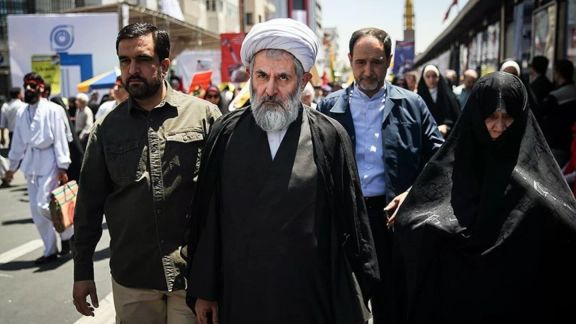
Emboldened by a modest US response to the killing of American soldiers, the former head of IRGC intelligence, Hossein Taeb, has claimed no country dares attack Iran.
Taeb, still a senior Revolutionary Guard official and an advisor to its commander-in-chief, said during an event on Thursday that the Islamic Republic is celebrating its 45th year since its establishment while no superpower has the courage for a military attack on Iran.
This week, the international community witnessed the US retaliation for approximately 160 attacks carried out by Iran-backed militia on US targets in the region since the Gaza war began on October 7, in strikes in Syria, Iraq and Yemen. On February 2, the US carried out airstrikes on more than 85 targets in Syria and Iraq , aiming at Iranian-backed forces including the group responsible for the Jordan strike that killed three American service members and injured over 40 others. A day later, American and British warplanes, with support from six allies, launched strikes at dozens of sites Houthi militants, one of Iran's biggest proxies.
The White House is under pressure mainly by the Republicans for a direct confrontation with Iran, though so far, has preferred to engage more directly with the proxies for fear of a wider conflict.

Every year in February, the government in Tehran holds about 10 days of nationwide events and gatherings to mark the anniversary of its establishment, the Islamic Revolution of 1979. The propaganda line has been the same for decades: Iran is a global powerhouse and is thriving despite growing international sanctions and a plethora of domestic problems.
Taeb claimed that “it is impossible for superpowers to escalate pressure on Iran to the point that economic problems and pressure on people's livelihoods lead to collapse.” Iran has been a scene of growing anti-regime labor and civil protests over economic woes and human rights abuses in recent years but the boldest uprising was the nationwide revolt that started after the death of 22-year-old Mahsa Amini in 2022 that came to be known as the Women, Life, Freedom movement.
The regime quashed months of rallies, killing about 600 people and arresting about 22,000. The crackdown on dissent and acts of social disobedience, mainly through women appearing unveiled in public, is intensifying day by day.
Taeb also downplayed the efficacy of measures to pressure Iran by the US and Israel, an idea that surprisingly resonates with countless officials in the US and other countries as well as Iranian dissidents and opposition figures. They concur that punitive measures are not enough to contain Iran in its destabilizing acts as it is advancing its nuclear and missile capabilities, with some saying that the international community’s appeasement with Tehran has only encouraged it. “America sought to confine Iran with the JCPOA (Joint Comprehensive Plan of Action), then with JCPOA 2... it aimed to restrict Tehran's military and regional power, consequently weakening Iran,” Taeb mentioned as instances of the US failure.
He boasted that Iran is now seen as a major threat against the US. "They wanted Iran to be only a normal country, but we turned into a regional power and threat. Now the world acknowledges Iran as one of the three countries challenging American hegemony,” he said, claiming, “Today, they say Iran has become a power of Islamic resistance and a regional force, meaning it will defeat American hegemony and itself become a hegemon."
Last year, Taeb claimed the US had sent messages to the regime through three neighboring countries of Iraq, Qatar and Oman, saying that it is not looking to overthrow the regime. The claims were not corroborated by Washington.
Taeb was pushed out as the head of IRGC’s intelligence in 2022, but maintains significant influence in the country’s intelligence apparatus, with political analyst Morteza Kazemian calling him as “one of the most feared men in Iran's security system.” Taeb has close relations with the Supreme Leader’s son Mojtaba Khamenei, a former comrade during the 1980s war with Iraq.
His dismissal came following multiple mysterious incidents in which IRGC officers and operatives were killed or died in unexplained circumstances. Iran blamed Israel for some of the incidents. Taeb was harshly criticized by social media activists and politicians for failing to detect and prevent Israel's operations in Iran. The fact that an Israeli news outlet, Kaan News reported Taeb's removal from his post several days before its confirmation by Iranian officials, was another indication that Israel had access to insider information from the IRGC Intelligence Organization.